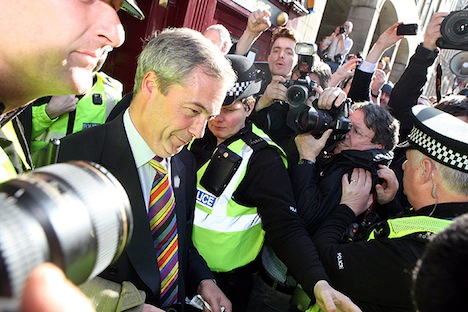In a static world, it’s easy to believe that UK prime minister David Cameron’s call in January 2013 for a referendum on the United Kingdom’s continued membership in the European Union will never come to pass — it depends upon the reelection of a Conservative-led in the 2015 general election, Cameron’s continued Tory leadership and a lengthy process of negotiation thereafter with EU leaders. ![]()
![]()
So when Cameron agreed with Scottish first minister Alex Salmond two months later to hold a referendum on Scottish independence in September 2014, he had every reason to believe that he had bought enough time to keep the European issue relatively calm. After all, poll after poll shows the pro-independence vote lagging far behind the anti-independence vote and, despite a relatively large number of undecided Scottish voters, many polls throughout 2012 and early 2013 showed the ‘no’ vote with over 50% support. One Ipsos poll earlier this month showed that 59% support union and just 31% support independence.
But what’s increasingly clear is that the two referenda are becoming inseparable — Scotland’s future role in the United Kingdom depends on the United Kingdom’s future role in Europe. With Westminster now increasingly turning to its toxic obsession with its union with Europe, a group of largely English parliamentarians may well be endangering the more longstanding three-century union with Scotland.
It’s easy to follow Cameron’s arithmetic here: Allow the United Kingdom Independence Party (UKIP) and the more euroskeptic members of his own party their opportunity for an anti-Europe outlet in the May 2014 European Parliament elections. Then sail through the September 2014 Scottish referendum with both the Labour Party and the Liberal Democratic Party united against Scottish independence, maybe even by promising ‘devomax,’ a form of further devolution of tax and spending powers to the Scottish parliament that came into existence in 1999. Cameron could therefore put the specter of Scottish independence behind him before looking to the next general election and, if successfully reelected, the EU negotiations that would precede the long-promised EU referendum.
What Cameron didn’t count on was the growing chorus of euroskeptic rage from within his own party, which seems destined to repeat the Tory infighting of the 1990s that so destabilized former prime minister John Major’s government Education minister Michael Gove’s insisted last week, for example, that he would support leaving the European Union if a vote were held immediately. Over 100 Tory backbenchers are calling for a law to guarantee a referendum later this decade or even for a referendum before 2015, and one Tory MP is even arguing for a full joint Tory/UKIP electoral coalition in 2015. Some Tories are even trying to look beyond Cameron to a more Euroskeptic leader, perhaps even Gove. It comes at a time when UK voters insist in poll after poll that they would overwhelmingly vote to leave the European Union in a referendum.
UKIP’s rise hasn’t helped, and Nigel Farage’s insistence at contesting a Scottish by-election led to the somewhat humorous result of his being chased out of a pub in Edinburgh last week (pictured above). Though it’s a safe bet that Farage and UKIP won’t make many inroads in Scotland, it’s hard to see how his active presence in Scotland could do anything but make things worse for unionist supporters. His party is currently polling as much as 20% in national polls, outpacing the Liberal Democrats and, in some cases, pulling to within single digits of the Conservatives (giving Labour a sizable lead). Even if Labour wins in 2015, if UKIP wins the support of one out of every five UK voters, it will pull not only the Tories, but probably even Labour, further toward euroskepticism and eventual rupture with Europe. Continue reading A tale of two referenda: How the EU debate could poison the Scotland debate
